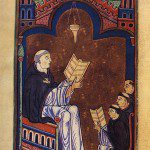![St. Augustine by Philippe de Champaigne [Public domain], via Wikimedia Commons](https://wp-media.patheos.com/blogs/sites/637/2016/09/Saint_Augustine_by_Philippe_de_Champaigne-235x300.jpg)
One of the significant theme Augustine found throughout the writings of the philosophers, indeed, what he believed was a foundation for philosophy itself, was the attempt to discern and establish “the happy life.” Here, he believed they were right in asking the question, but the answers they gave were quite mistaken. Fundamental to Augustine was the belief that the answer can lie only with God and full submission to God as the center of one’s life; the philosophers, he thought, failed at this in one fashion or another (sometimes by their refusal to reform pagan society, sometimes by their own selfish ambition). Despite this, Augustine thought one thing many of the philosophers taught was right: the happy life was related to virtue, and virtue itself was not to be seen merely as an individualistic good but something which must be seen as a social good:
So much for the philosophers’ ‘happy life.’ What we Christians like better is their teaching that the life of virtue should be a social life. For, if the life of the saints had not been social, how could the City of God (which we have been discussing in all these nineteen books) have a beginning, make progress, and reach its appointed goal? [2]
Christians, Augustine argues, sees virtue as social, and this is because of how Scripture sees Christianity as a social phenomenon. The Bride of Christ, the Church, is the unified body of the believers as they are joined together through bonds of love in Christ. They are not to be individuals cut off from each other. They are bound to one another by love. And that love requires them to be social, for love is not love if it is individualistic. A Christian is expected to be in a loving relationship with the rest of humanity, to open themselves up and give of themselves to the other, and in return, having opened themselves up they can then receive the gift of love back to them from the other. This is one way Christians find themselves to be in the image of God, the God who is love. For by being love, God is able to be one and three, one God and three persons, for those three persons are one God because of that love. The Father begets the Son in love, and the Holy Spirit flows from the Father through the Son and back to the Father as the Spirit of love.
![The New Jerusalem by Facundus, (Madrid, Biblioteca Nacional) [Public domain], via Wikimedia Commons](https://wp-media.patheos.com/blogs/sites/637/2017/04/B_Facundus_254-204x300.jpg)
Since the foundation of the law and prophets is the rule of love, love of God and our neighbor as ourselves, we find that morality is fundamentally relational. It unites us with our neighbor in God. Since this is the case, then our virtue, our holiness, is tied to the way we treat our neighbor, how we work for them and their welfare. Social justice is at the heart of the law, for justice is established by love, and love must be social for it to be love. If we want to be built up by God and find our place in the city of God, we must therefore open ourselves up and work for the benefit of the other so that they can join us with the love of God in eternity. We cannot be islands cut off from everyone else and think ourselves to be virtuous; we can’t retreat into bastions of civilization, holding out against the world, and think that what we are doing is moral. We must be social. We must build ourselves up in and through our engagement with the other. For unless we do so, we find that selfishness and pride is at the foundation of our work, and so whatever apparent good we do is corrupt in the core and to be discarded as the immoral trash it really is.
[1]His criticism often was with the myths and legends as found in the writings of the poets and dramatists and the relationship the gods seemed to have with society through such representations. There was, Augustine believed, often a contradiction being put in place: if humans did what the gods were shown to do, they would be judged and condemned, and yet the gods seem to be pleased with and accept such representations for themselves. Philosophers sometimes tried to purify the image of the gods in and through their reflections, but then joined in and supported the worship which established and justifies those images. Much of what they said was worthy of respect in relation to the rest of the pagan tradition, with Plato and the Platonists being the best, but then Augustine said in contrast to revealed truth, they were still so far away and needed to be criticized.
[2] Saint Augustine, City of God Books XVII-XXII. Trans. Gerald G. .Walsh SJ and Daniel J Honan (New York: Fathers of the Church, Inc., 1954), 202 [XIX.5].
Stay in touch! Like A Little Bit of Nothing on Facebook:
A Little Bit of Nothing











